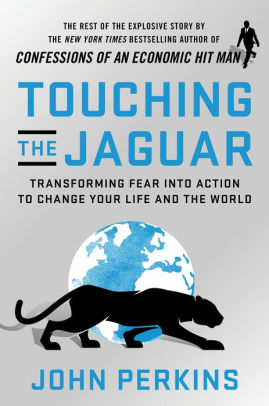John Perkins has led an interesting life. In the 1970s he was instrumental in convincing third world countries to over-expand their infrastructure; the stated goal was to build the trellis for their economies to grow up around, but mostly what was accomplished (by his own reckoning) was a never-ending cycle of crippling debt, forgiveness, and new debt. He wrote about his experiences in his book Confessions of an Economic Hitman. Since then, he went through what he describes as a crisis of conscience, resulting in him turning his life 180 degrees. Fast forward to today, and Perkins is deeply embedded in indigenous cultures in the Amazon, learning about their shamanistic and animist practices and guiding a new generation of economic leaders towards what he calls the "Life Economy."
I found this whole book problematic for a couple of reasons; note that I really mean "problematic", not in the new sense of "horrifying but I'm being polite." Yes, Perkins seems sincere about his passion for the religious traditions of the people of the Amazon and the Andes, but he's still an economically advantaged white man from New Hampshire telling us about the value of Amazonian shamanism. He does so not in a pure context of learning and respecting the tradition, but as a metaphor for some fairly standard personal development advice, in this case to use your fear as a catalyst for positive action. This isn't the worst sort of offense along these lines, but neither is it harmless. Perkins is also sometimes hard to take seriously, given his penchant for outrageous and unproven (and perhaps un-proveable, to be fair) claims about, for example, the NSA's involvement in placing him in his early career.
The reason I call all of the above "problematic" is that the book actually has some valuable perspectives, particularly in his model of the admittedly melodramatic "Death Economy" versus "Life Economy." The Death Economy is his term for, well, modern industrial economies with their disdain for environment harm and human oppression. His call to move towards a Life Economy comes with some examples of his vision while admittedly being light on the "how exactly do we get there?" part. Given that advice on concrete steps are what is most needed, leveraging his experiences amongst those who inspire him to map out the beginning, at least, of a path would have been a worthy capstone for his book.
While there have always been those who were sensitive to cultural appropriation, the truth is that for many readers Perkins would have seemed inoffensive, even somewhat tame in the lessons he says he's learned from indigenous cultures in Central and South America. Conversely, I have to admit to being surprised that he maintains a fairly prominent position in circles where this kind of thing is getting less and less of a pass every day. There are positives that you can take away from Touching the Jaguar, but those lessons can be found elsewhere without the same problems.
~ review by Patricia Mullen
Author: John Perkins
Berrett-Koehler Publishers, 2020
pp. 264, $27.99
Touching the Jaguar: Transforming Fear into Action to Change Your Life and the World

©
2010 - 2024
Facing North
